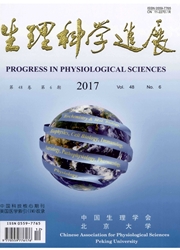

 中文摘要:
中文摘要:
神经节苷脂(ganglioside,GS)是一类含唾液酸的糖鞘脂,广泛存在于脊椎动物各组织细胞膜上,尤其在胎儿和新生儿的脑中高浓度存在,因此被认为与神经细胞的分化、神经树突的伸长、突触的形成有重要关系,较早的研究就已发现外源性施加神经节苷脂可以促进神经系统的再生和突触的形成。随着合成技术和分子生物学技术的进步,发现神经节苷脂不仅与神经系统的发育、老年痴呆、帕金森症等神经退行性疾患有密切关系,而且与肿瘤的发病过程也有一定的联系,由此受到广泛关注。本文结合本实验室的研究工作,对近年国际上对神经节苷脂在生物学活性方面的研究进展,从突触可塑性、神经退行性疾病、肿瘤三方面予以综述。
 英文摘要:
英文摘要:
Ganglisides( GS), a series of glycosphingolipids with sialic acids, are widespread in the cell membrane of tissues of the vertebrates, especially enriched in the brain of fetus and neonatal brains, therefore it's believed that GS may be associated with the neuronal differentiation, dendritogenesis and synapse formation. Earlier study had confirmed that GS could promote the regeneration of the nervous system and the synapse formation. With the development of the synthesis and molecular biological technique, reseachers have found that GS are not only related to the development of neurons system and degeretive diseases such as Alzheimer's disease and Pakinson's disease, but also to the process of tumor invasion, which have attracted much attention in recent years. Intensive studies have been conducted on ganglioside concerning its chemical structure, pharmacological features and clinical application. This review summarizes the development of ganglioside's biological activities in recent ten years, including the research finding in our laboratory.
 同期刊论文项目
同期刊论文项目
 同项目期刊论文
同项目期刊论文
 期刊信息
期刊信息
